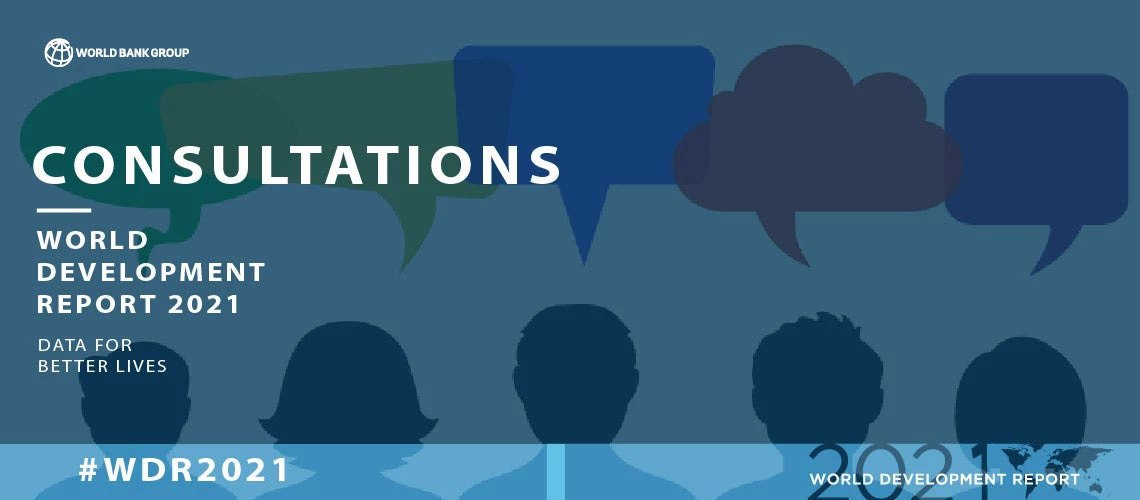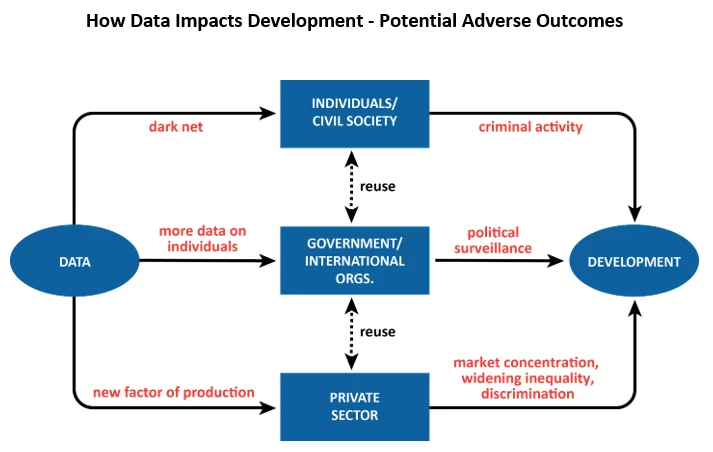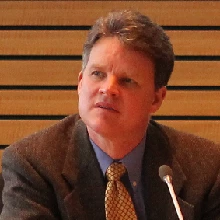 Concept note visual
Concept note visual
A few months ago, we announced that the topic for the next World Development Report 2021 would be “Data,” and what it means for development. Since then, our ideas have evolved into a more comprehensive Concept Note on “Data for Better Lives”, which we are happy to release today for your feedback and comments.
The value of data is largely untapped
The omnipresence of data in the daily lives of most people in the world gives rise and support to the view that data will change the world. With the unprecedented rate of data creation, and the increasing role data plays in most of our lives, it is easy to assume that the digital revolution could be the most important life-changing event of this era. And, as the world battles COVID-19, the value and potential development impact of data have become all the more evident. To reflect this, COVID-19 examples will be used throughout the report to illustrate many of the issues that will be discussed in the report.
But despite this unprecedented growth, much of the value of data is still untapped, waiting to be realized. Typically, data are collected by one party for one particular purpose. Yet, afterwards, it remains available for potential reuse that may generate economic value in different applications far beyond those originally anticipated. However, many barriers stand in the way of such beneficial reuse of data. These range from misaligned incentives, to disorganized and incompatible systems, to a fundamental lack of trust.
Along with the promise of amazing advances in the ways data can help development, also comes new concerns about personal data protection, surveillance, misinformation, attacks on data systems, and potential abuses of market power in data-based businesses. Through a discussion of the numerous pathways in which data can help economic development, this report aims also to describe the challenges to realizing these gains, offer guidance on how to attain them, and propose safeguards for protecting citizens.
Current data landscape and the environment needed to realize data’s potential
The conceptual framework sets out the central theme of the report of how data – including data collected primarily for public policy and data created primarily for private, frequently commercial purposes – can lead to both positive and negative development outcomes. The first part of the report will examine the vast potential for data to improve the lives of poor people through improved use and re-use of data to design better public programs, policies, and service delivery, in addition to improved market efficiency and job creation through more private sector growth. Realizing this potential will require a significant re-thinking and restructuring of data systems, in particular data systems supporting the use of public sector data. The envisioned restructuring of data systems would place data centrally in policy-decision making processes and vastly improve the flow of data to ensure that it can be used repeatedly by a wide variety of stakeholders.
Creating this sort of system though also entails risks – in particular, risks that data could be misused to harm people. The second part of the report will then focus on issues of governance, law, policy and infrastructure that can enable the use and reuse of data to deliver the potential benefits while creating safety measures that mitigate risks against harmful outcomes.
The ‘development filter’: Unlocking data’s potential for the poor
All the above will be discussed with the focus on how data can benefit poor people in low- and middle-income countries. We call this the report’s development filter. What this means is that the report must grapple with the issue of whether and how data can really make a difference in the lives of the world’s 700 million people living in extreme poverty on less than $1.90 per day or, the 900 million people living without access to electricity;[i] many of them lacking access to the internet, or even electricity, and leaving few if any, digital trails from economic transactions. In addition, the report will be written from the perspective of policy-makers in lower income countries. Too often, they lack the infrastructure, legal and regulatory frameworks and institutional capacity to create a suitable environment for the data economy to flourish; or even the scale to benefit economically from data-based innovations. Moreover, their voices may not always be heard in the international fora where the global governance rules of the new data economy are being written.
We would like to hear your views
As the title – Data for Better Lives – is meant to indicate, the aim of the report is to put people at the center. This is why we need your help, to understand your views on how data can fully realize its potential for development. Though the current circumstances pose many challenges for in-person consultations, we are seeking a diverse range of perspectives - from governments, private sector, international organizations, academia and civil society organizations.
As a first step of our broader consultation efforts, we are launching an online consultation with the release of the concept note. Please accept our invitation to provide your comments through the consultation platform or by writing to us at WDR2021@worldbank.org.
Below are a few key questions to guide your thinking, in the areas where we most need your feedback:
- The report focuses on opportunities and challenges of data to improve the lives of poor people in low- and middle-income countries. Can you share an example of how data have directly helped to improve the lives of poor people in your community? Are there other issues within the context of development that we should consider?
- The report will aim to find a balance between data’s potential to improve the lives of the poor, and the risk of misuse. Can you provide examples of policies or tools that effectively safeguard against the misuse of data and prevent harm, while enabling us to untap its full value to benefit the wellbeing of people?
- Can you provide an example of where data collected for private purposes (e.g. through apps of private companies, digital commercial transactions, etc.) have been used to benefit poor people in your community? Are there examples where such data have impacted people negatively?
- What data governance and policy reforms are needed for less developed countries to benefit from the data economy? Does the report adequately address these issues (infrastructure, legal, institutions, economic policy challenges, etc.)?
- Are there any other important issues that the report misses and should be included in the report? Do you have any other general feedback on the topics covered in the report?
We are looking for case studies and examples of how data have changed people’s lives. Please share any documents and information by writing to WDR2021@worldbank.org by June 30th, 2020.
You can find more details of our plan at the WDR 2021 website, which will be updated as new consultations are planned. Do review our concept note and send us your comments. We look forward to hearing from you.
Reference links
[i] Estimate based on tables from the World Bank’s World Development Indicators indicating that 86.8% of the world’s population has access to electricity in 2015 and based on United Nation’s Department of Economic and Social Affairs estimates of global population of 7.38 billion people in 2015.







Join the Conversation